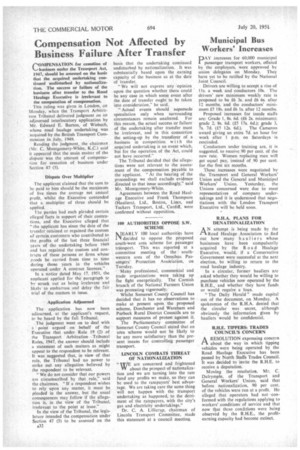Compensation Not Affected by Business Failure After Transfer
Page 34

If you've noticed an error in this article please click here to report it so we can fix it.
COMPENSATION for cessation of 1......business under the Transport Act, 1947, should be assessed on the basis that the acquired, undertaking continued undisturbed by nationalization. The SUCCCKS or failure of the business after transfer to the Road Haulage Executive is irrelevant to the computation of compensation. This ruling was given in London, on
Monday, when the Transport Arbitra tion Tribunal delivered judgment on an adjourned interlocutory application by Mr. Edward E. Burton, of Wisbech, whose road haulage undertaking was acquired by the British Transport Com mission in July, 1949.
Reading the judgment the chairman (Mr. C. Montgomery-White. K.C.) said it appeared that the main matter of the dispute was the amount of compensation for cessation of business under Section 47 (3).
Dispute Over Multiplier The applicant claimed that the sum to he paid to him should be the maximum of five times the average net annual profit, whilst the Executive contended that a multiplier of three should be applied.
The parties had each pleaded certain alleged facts in support of their contentions, and the Executive alleged that the applicant has since the date of the transfer retained or regained the custom of certain customers who contributed to the profits of the last three financial years of the undertaking before 1949 and has regained the custom and conincts of these persons or firms whose goods he carried from time to time during those years in the vehicles operated under A contract licences."
In a notice dated May 17. 1951, the applicant applied for the paragraph to he struck out as being irrelevant and likely to embarrass and delay the fair trial of the matters in issue.
Application Adjourned The application has now been adjourned, at the applicant's request, to be heard by the full Tribunal.
The judgment went on to deal with , a point argued on behalf of the Executive that under Rule 19 (2) of the Transport Arbitration Tribunal Rules, 1947, the answer should include a statement of such matters as might appear to the respondent to be relevant. It was suggested that, in view of that rule, the Tribunal had no power to strike out any allegation believed by the respondent to be relevant.
" We do not consider that our powers are circumscribed by that rule," said the chairman. "If a respondent wishes to rely upon any matter, it must be pleaded in the answer, but the usual consequences may follow if the allegation is, in the view of the Tribunal, irrelevant to the point at issue."
In the view of the Tribunal, the legislature intended the compensation under Section 47 (3) to be assessed on the
a32 basis that the undertaking continued undisturbed by nationalization. It was substantially based upon the earning capacity of the business as at the date of transfer.
"We will not express any opinion upon the question whether there could be any case in which some event after the date of transfer ought to be taken into consideration," he said.
"Actual events should supersede speculation only when surrounding circumstances remain unaltered. For this reason, the actual success or failure of the undertaking after transfer must be irrelevant, and in this connection the setting-up by the transferer of a business in competition with the acquired undertaking is an event which, but for the operation of the Act, could not have occurred."
The Tribunal decided that the allegations were not relevant to the assessment of the compensation payable to the applicant. "At the hearing of the proceedings we shall exclude evidence directed to that issue accordingly," said Mr. Montgomery-White.
Agreements between the Road Haulage Executive and Frank Thompson (Hauliers), Ltd., Boston, Lines, and Tuckers Transport, Ltd., Cardiff, were confirmed without opposition.




















































































